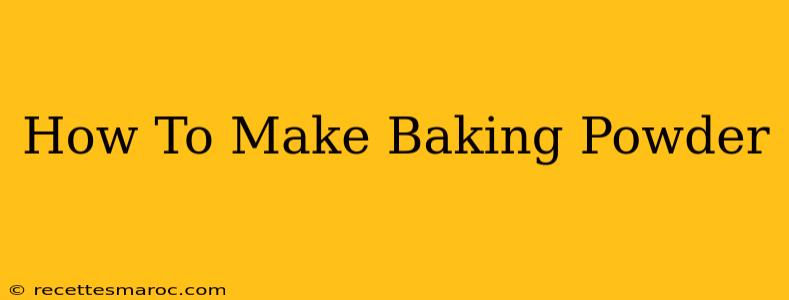Baking powder is a leavening agent, meaning it helps baked goods rise. It's a convenient mix of baking soda and an acid, but did you know you can make your own? This guide will walk you through the process, explaining the science behind it and offering tips for success. Making your own baking powder is a great way to control ingredients and ensure freshness.
Understanding the Components of Baking Powder
Baking powder typically consists of two main components:
-
Baking Soda (Sodium Bicarbonate): This is the alkali component that creates the lift in your baked goods. When combined with an acid and moisture, it releases carbon dioxide gas, causing the batter or dough to rise.
-
Acid: This is the crucial component that reacts with the baking soda. Common acids used include cream of tartar (potassium bitartrate), monocalcium phosphate, or sodium aluminum sulfate. The type of acid used will impact the speed and strength of the leavening action. Cream of tartar is most commonly used for homemade baking powder due to its availability and effectiveness.
How to Make Baking Powder at Home: A Simple Recipe
This recipe uses cream of tartar, offering a reliable and readily available acid source.
Ingredients:
- 12 teaspoons (60ml) Baking Soda
- 24 teaspoons (120ml) Cream of Tartar
Equipment:
- A medium-sized bowl
- A whisk or spoon
- An airtight container for storage
Instructions:
- Measure: Carefully measure out 12 teaspoons of baking soda and 24 teaspoons of cream of tartar. Accuracy is important here for consistent results.
- Combine: Gently whisk or stir the baking soda and cream of tartar together in the bowl until they're thoroughly combined and there are no lumps. This ensures even distribution of the acid and alkali throughout your baking powder.
- Store: Transfer the homemade baking powder to an airtight container. Store it in a cool, dry place away from direct sunlight and moisture. Proper storage is essential to maintain its leavening power.
Double-Acting vs. Single-Acting Baking Powder: What's the Difference?
Baking powder is categorized as either single-acting or double-acting.
-
Single-acting baking powder: Releases all its carbon dioxide gas as soon as it's mixed with wet ingredients. It’s best used in recipes where the baking process happens quickly after mixing, like muffins or drop biscuits.
-
Double-acting baking powder: Releases some carbon dioxide gas when mixed with wet ingredients and releases the rest when exposed to heat in the oven. This provides a more consistent rise and is better suited for recipes that require a longer baking time like cakes or quick breads.
The homemade baking powder recipe above is a double-acting version because it utilizes the reaction between baking soda and cream of tartar which is initiated by moisture and further enhanced by heat during baking.
Tips for Success and Storage
- Accuracy is key: Precise measurements are crucial for consistent results. Use a measuring spoon designed for dry ingredients.
- Airtight container is a must: Store your homemade baking powder in an airtight container to prevent it from absorbing moisture, which can reduce its effectiveness.
- Shelf life: Properly stored homemade baking powder will last for approximately six months. Check for any signs of clumping or a loss of potency before use.
- Testing your baking powder: To test the potency, add a teaspoon of baking powder to a cup of hot water. If it fizzes vigorously, it is still active.
Why Make Your Own Baking Powder?
While convenient store-bought baking powder is readily available, making your own offers several advantages:
- Freshness: Homemade baking powder is guaranteed to be fresh and potent, unlike commercially-produced baking powder that might have been sitting on shelves for some time.
- Ingredient Control: You know exactly what's going into your baking powder, avoiding any artificial additives or preservatives that might be present in some commercial brands.
- Cost-Effective: In the long run, making your own baking powder can prove to be more cost-effective.
By following this simple recipe and storage guidelines, you can easily make your own baking powder and enjoy the benefits of fresh, high-quality leavening in your baking projects. Happy baking!

